Inside the lifesaving unit at the Royal Children’s Hospital that cares for sick Victorian babies
It’s a place where babies are locked in an hourly battle for survival, with families experiencing heartbreaking lows and exhilarating highs. Learn more about this special unit at our Royal Children’s Hospital.
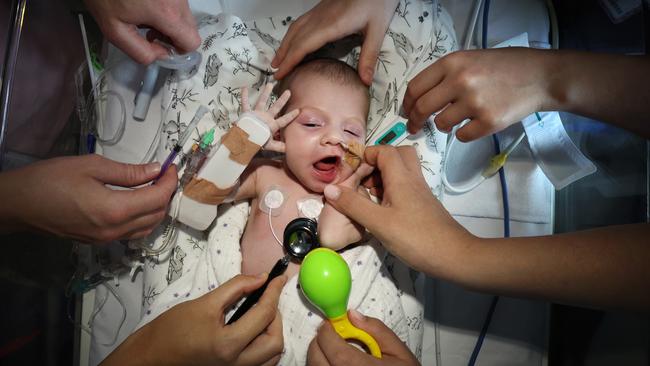
Health
Don't miss out on the headlines from Health. Followed categories will be added to My News.
From heartbreaking lows to exhilarating highs, the neonatal intensive care unit at the Royal Children’s Hospital is a place like no other.
It’s a place where babies are locked in a battle for survival from one hour to the next.
And it’s a place where the biggest miracles happen to the tiniest humans every day.
While these are Victoria’s smallest and sickest babies, they might just be our biggest and mightiest heroes.
With every precious heartbeat and intake of breath, these fragile babies edge one step closer to winning the battle of their lives.
Ahead of the Good Friday Appeal, we meet some of Victoria’s littlest warriors in the NICU.
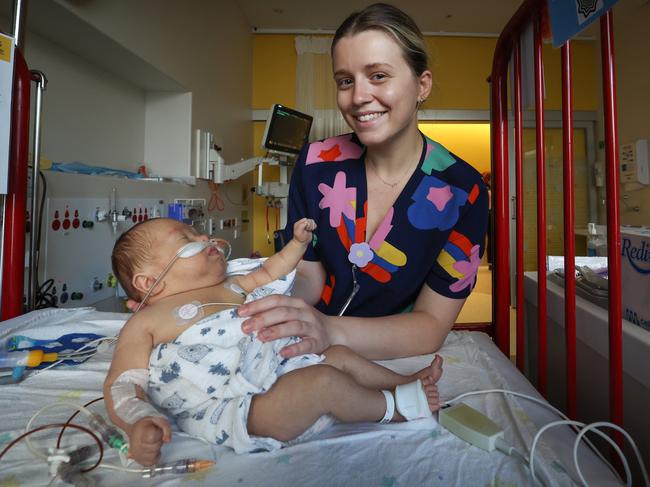
Little George weighed just 699g when mum Jasmin Ford gave birth at 24 weeks, and he endured two brain surgeries and two bowel surgeries in his first weeks of life.
“He was the size of my hand and literally looked like a doll when he was born,” the Mildura mum says.
Mrs Ford was flown to Melbourne in the middle of the night to give birth when she went into dangerously early labour, before George was raced to the Royal Children’s.
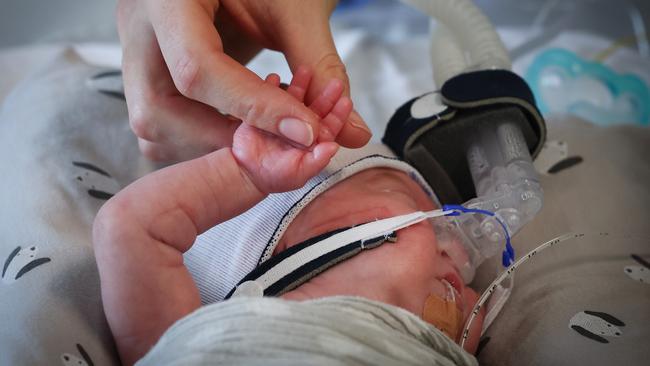
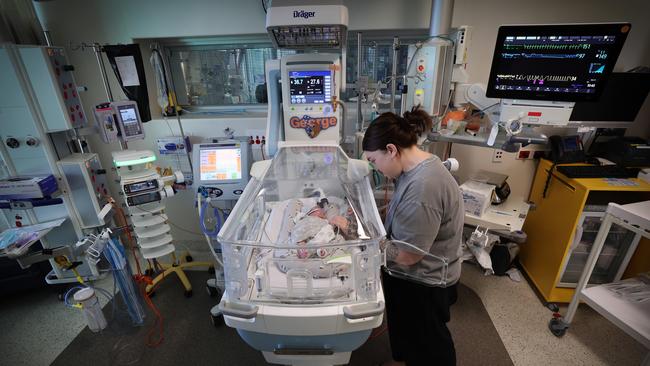
“It was very touch and go for a while. He had brain bleeds,” she says.
“It’s been emotionally exhausting, physically as well.
“But, well, I would do it all over again for him.”
The 10-week-old still breathes through a snorkel CPAP mask because his tiny lungs are not yet developed enough to go it alone.
But it’s not only premmie babies who come to the NICU.
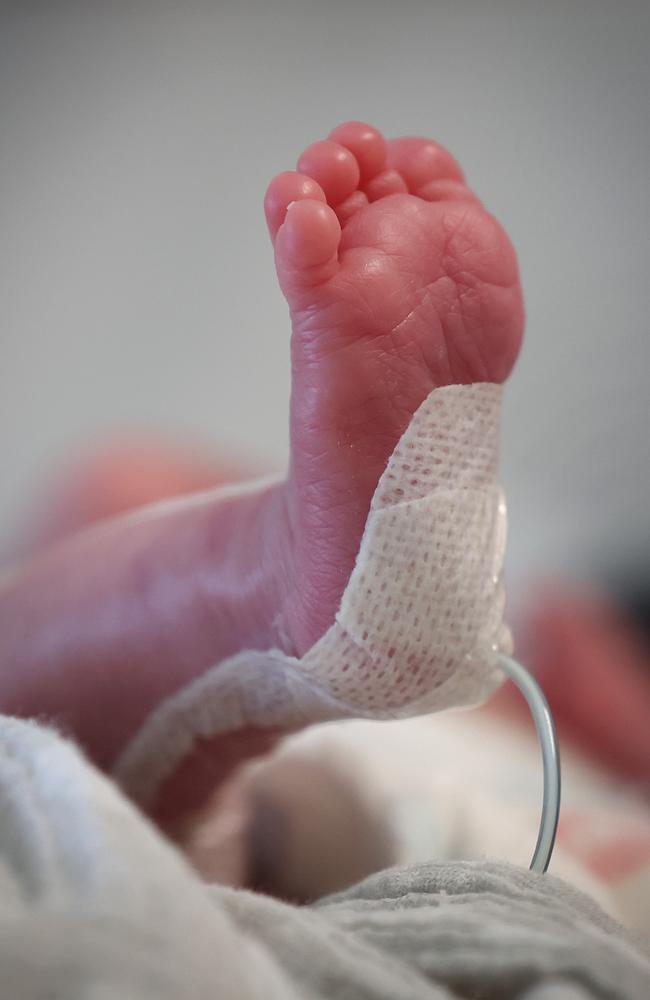
Down the corridor in the NICU, better known as the Butterfly ward, is two-week-old Zoe, born at full-term weighing a healthy 3kg.
First-time parents Cristy and Nicholas Loizou spent months over summer decorating Zoe’s nursery – ironically, with butterflies – and building flatpack furniture.
But just three days after they took Zoe home from hospital, she fell desperately ill.
The Bundoora couple took her to emergency, and she was rushed to the Royal Children’s NICU, where she had urgent surgery for an anal rectal malformation.
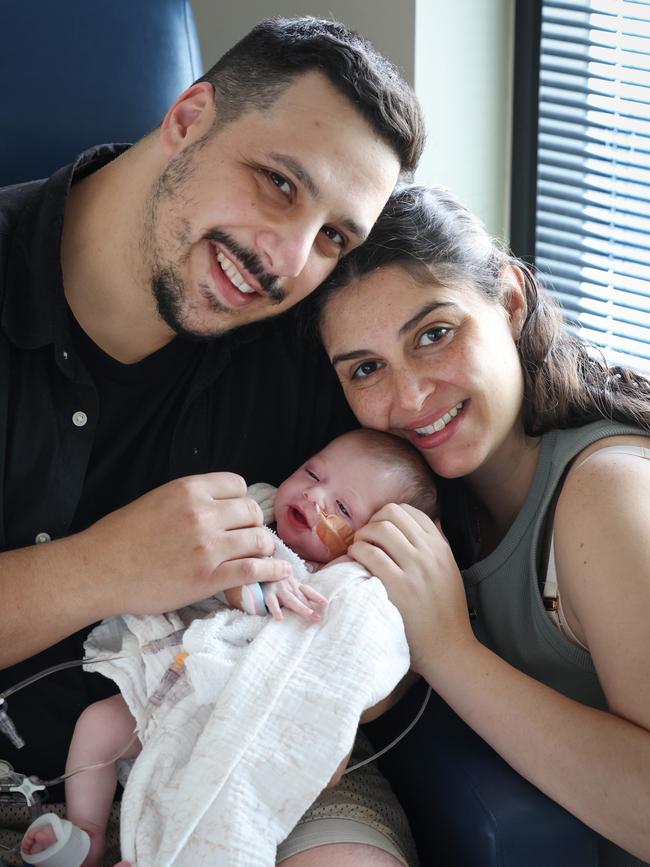
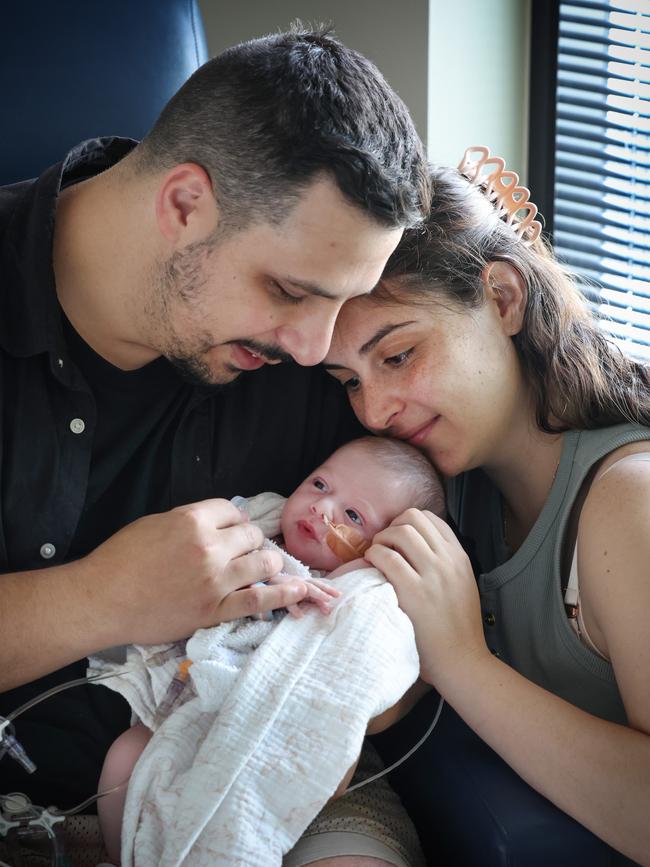
“They’ve brought the colon out onto her tummy and she’s got the bag attached, and she’s on the road to recovery,” Mrs Loizou says.
“It’s been an emotional rollercoaster.
“It’s not what we envisioned, especially being able to take her home and thinking everything was OK.
“Hearing that she would need surgery, and then seeing her off to surgery was really hard and confronting. Even leaving her behind every night, it’s been really hard.”
Like many families in Butterfly, the Loizous spend all day by their daughter’s bedside.
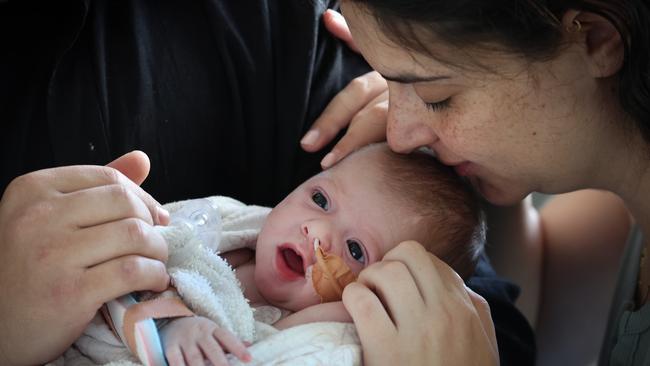
For some, it’s been much longer, like first-time mum Anthea Giannakopoulos, in the adjoining room, with 10-week-old son George, born at 29 weeks.
The IVF bub, born weighing 1.3kg, is recovering from surgery to remove a staggering 40cm of small bowel when he was 11 days old.
“He developed necrotising enterocolitis, which is dead bowel,” Ms Giannakopoulos says.
“It was touch and go. They said he might not survive.
“They said it can be fatal because so much bowel needed to be removed.
“It was just devastating. To go through the IVF journey, then have this happen.”
The 54-year-old solo mum from Kew is no stranger to heartbreak, after losing another baby in 2018.
“I lost the baby at 23 weeks and four days,” Ms Giannakopoulos says.
“They didn’t resuscitate back then; they do now. He was all right, he came out breathing, they just didn’t do it back then.”
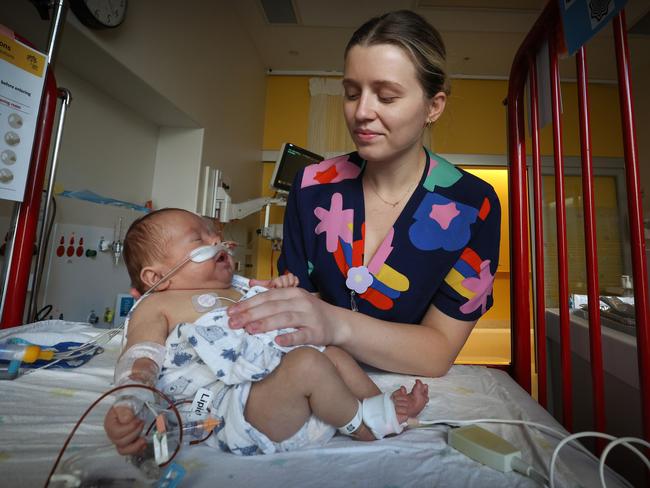
For two months, Ms Giannakopoulos has barely seen her home in Kew in Melbourne’s eastern suburbs in daylight.
All day and evening, she cares for George alongside the nurses, emptying his stoma bag, measuring the output.
It’s a world away from how she imagined her first months of her long-awaited dream of motherhood.
But there is nowhere else she would rather be.
“I want to be here every minute,” the doting mum says.
“I don’t want to leave.”
The 32-bed NICU helps 600 to 800 babies a year.
The record for the bub with the lowest birth weight is 396g, while the longest stay on record was 244 days.
There’s a familiar rhythm to the daily ebb and flow of the NICU.
The first rush hour starts about 6am when the surgeons and their teams of staff visit their patients, for check-ups before and after surgery.
From 9am, the ward round begins, and doctors, nurses and other medical staff gather around each bub to discuss their progress and care.
It’s a 9am-5pm or even 9am-9pm day for many NICU parents, seven days a week, sometimes month after month.
The parents arrive early not just to listen to the ward round, but to actively participate as decision makers and drivers in their babies’ care.
It’s a key tenet of the NICU’s COCOON program – circle of care optimising outcomes for newborns.
Cocoon care co-ordinator Julia McKeown says many NICU parents feel disempowered, and her role is to help “parents to be parents” in the NICU.
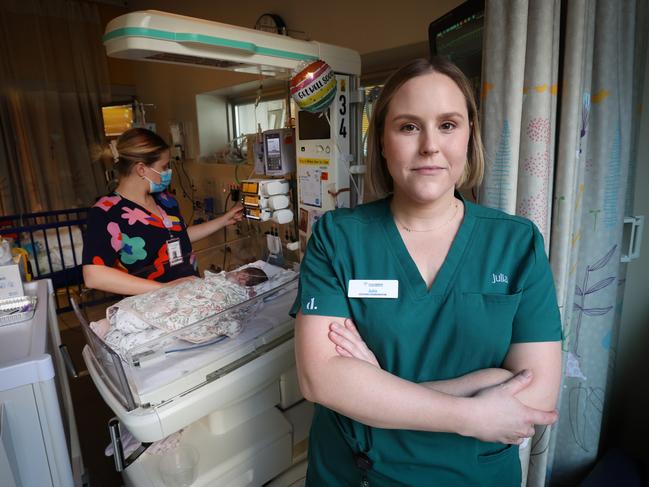
“We take their babies away and tell them they’re parents, then their first experience is leaving a hospital without their baby,” she says.
“It’s pretty traumatising.
“A lot of these babies have had the antenatal diagnoses of surgical complications, so they haven’t even had that pregnancy experience of normality.
“They’ve probably had periods in their pregnancy of complete fear and anxiety and thinking that this is not what we bargained for when we had a baby.”
The COCOON model also flips the old mantra of “doctor knows best”, and respects and values parents’ instincts.
“You know your baby best; your baby knows you,” Ms McKeown says.
“You kind of have that, ‘Oh, well, we’re not medical professionals, we don’t know’. They do know. They have instinct. And they have a bond with their baby before they’re born.”
While many NICU parents are by their baby’s bedside all day, others are far away in far-flung country Victoria, or even Tasmania or South Australia.
Parents can interact with their bubs via “baby chat” through the Royal Children’s telehealth system using computers with video cameras in every room.
When parents can’t be there, nurses will often give their tiny patient a cuddle.
It’s undoubtedly a perk of the job, but also fulfils the baby’s essential developmental need for human touch and interaction.
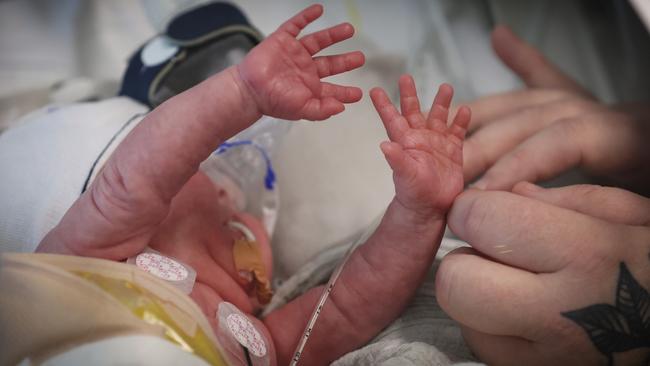
One of the most crushing parts of being a NICU parent is the separation anxiety at night.
Little George’s mum, Mrs Ford, and her husband are lucky to be staying nearby at Ronald McDonald House.
Mrs Ford’s day begins with a phone call to the nurse in George’s room to check he’s OK.
Then she comes straight to the hospital to spend all day by his bedside.
She goes home in the evening, then phones the nurse by George’s bedside again to check on him before flopping into bed herself.
Sometimes, she’ll call one more time in the middle of the night to check on George – just in case.
“The staff are absolutely fantastic – they’re angels,” Mrs Ford says.
“It’s 24-hour support.”
NICU parents will tell you constantly how amazing the nurses and doctors are.
For NICU nurses, it’s an incredibly satisfying and enjoyable job, despite the inevitable heartbreaks.
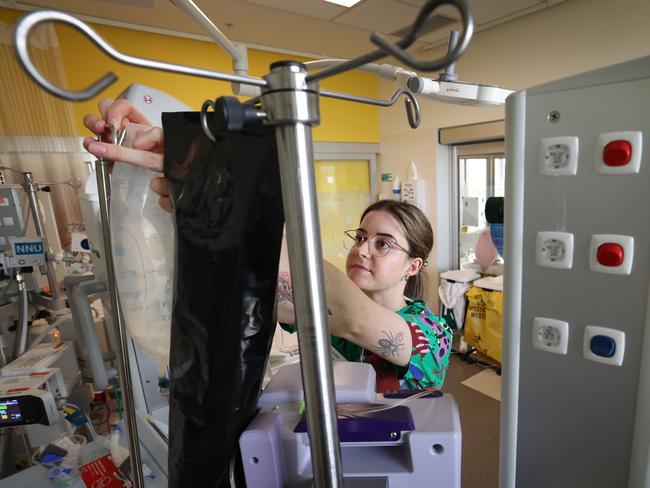
Ms McKeown, a former midwife, says she was previously never someone who bought into the ‘nursing as a calling’ idea.
“I did nursing because it made sense as a career,” she says.
“But this is definitely my calling. I can’t imagine doing anything else. I did my final nursing placement in the NICU and I just thought, ‘oh, this is special’.
By far, the most rewarding part is seeing the journey, both of babies and parents.
“We have these babies who come to us who are sick, sick, sick, sick, sick,” Ms McKeown says.
“And then we get to watch them have their first bottle, have their first breastfeed, have their first big bath, go home with their parents and thrive.
“And you see the evolution of parents from being terrified and stressed and so unsure to being confident and excited and it’s just so special.
“And you get to do a little bit to help them become a family and go home.”




